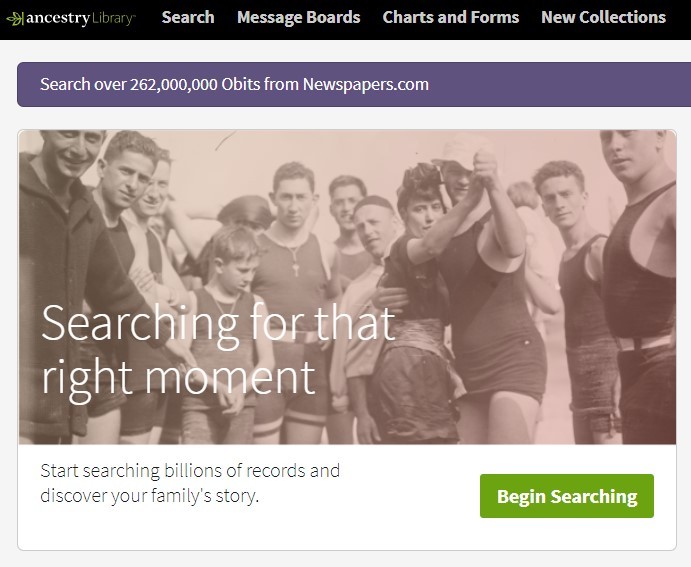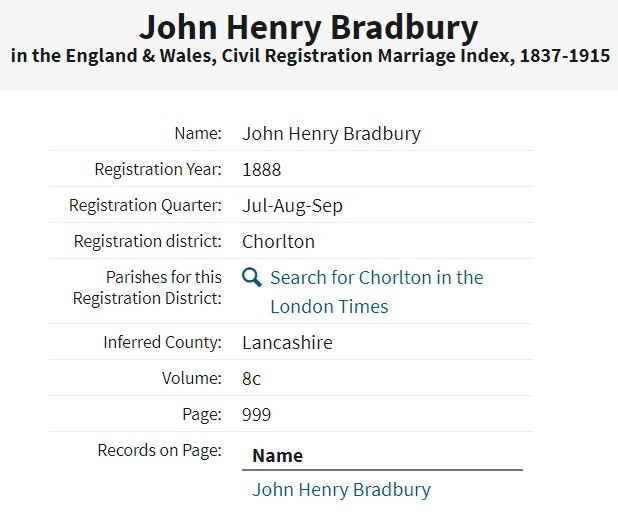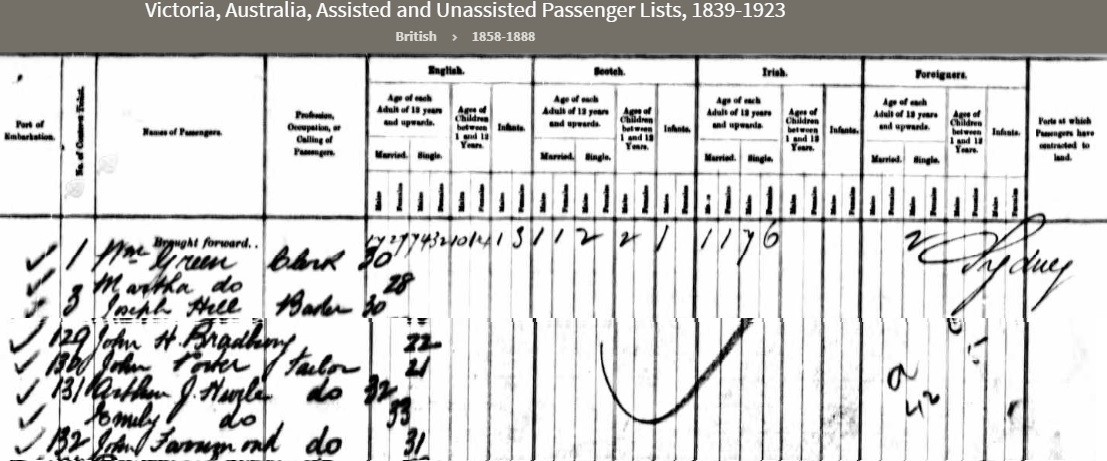Ancestry Library Edition
By Christina Ealing-Godbold, Research Librarian, Library and Client Services | 15 September 2023
Series: Our favourite State Library eresources.
People often ask us what our most loved eresources are. Admittedly we all have a favourite, or two, or three. It’s hard to pick as there are so many wonderful State Library eresources available. In this series our Librarians and Library Technicians share with you their most favourite eresources and how they’ve been used to solve research queries.
Next in the series we look at Ancestry Library Edition, a big favourite for many of our Library staff including Librarian Christina Ealing-Godbold.

Image from home page of Ancestry Library Edition database
So why is Ancestry Library Edition so fabulous?
You can use Ancestry to piece together a picture of the life of your ancestors and often unravel some family mysteries along the way.
You can access Ancestry Library Edition onsite at State Library of Queensland.
State Library receives many requests for information every week. Social history, family history and biography feature strongly in those information requests. As a Research Librarian, I use Ancestry as a valuable resource to answer questions in all three categories. The range of records available enable me to trace the life journey of people in Australia, Britain, United States, Europe and to a lesser extent, other jurisdictions including South Africa and the Pacific Islands.
As with all research, gathering together the known facts before you begin will assist you in drawing conclusions from the information that you find. Begin with what you know to be correct in your family, or in the biography of the person you are researching and then work backwards.
Census Records
The most useful records in Ancestry are the Census Records.
- Did you ancestors come from England?
From 1841 to 1911, and then 1939, the ages, occupations, place of residence, relationship to others in the household and place of birth are listed in the UK Census collection.
- Did you have an ancestor who lived in America?
Thanks to the meticulous work of the US census collectors, there is a record of each household from 1790 to 1950. What a wonderful rich source of social history.
The census stops at 1950 because of privacy legislation. The information on the census records can help you further your research. Both British and American census records were conducted every ten years so you can find a window of ten years in which your ancestor may have immigrated to Australia or elsewhere.
It is also very informative to find who else was living in the house with your relatives – the presence of another child with a different surname may lead you to find the illegitimate or orphan status of the child therefore helping to unravel family mysteries. A long list of persons of varying ages or surnames at an address can uncover the fact that the person resided in a workhouse, gaol, military barracks or asylum.
Unfortunately, Australian censuses were statistical only and so the wealth of social information contained in the British and American census records are not available for researchers.
Occupations of the past are documented in the Census Records. There are many jobs that do not exist anymore. One of the most interesting features of the census records is observing that children in the household very often had the same occupation as the parents. Here are some examples of occupations of a bygone era.
- Bleacher’s labourers (bleaching fabric or paper)
- Artificer (skilled mechanic)
- Howdy (midwife)
- Brightsmith (copper or tin smith)
- Feroner (ironmonger)
- Tenter (looked after machinery in a factory)
- Ag lab (agricultural labourer)
Knowing something about the likely occupation of the person you are researching assists in unravelling the enormous amount of records for people with common names like George Jones and Thomas Smith.
Births, Deaths and Marriages
Births, deaths and marriages (often called Vital Records) are essential in ensuring that your research is correct. Many of the research enquiries we receive involve finding the correct birth or death record for an ancestor. Finding the record for the birth of your ancestor can be time consuming and challenging.
Families looking for work in hard times moved across county boundaries. Take the time to look at other towns around the area in which the family were last located. Looking at variations in spelling of the name can also produce results. Many of our ancestors were not literate and so the way the name was pronounced could be written in a myriad of ways.

England and Wales marriage civil registration index entry from Ancestry Library Edition
Immigration and Travel
Immigration and travel were popular among British, European and American families in the 19th century and early 20th century. Ancestry provides a wide range of records to enable you to find which ship the person travelled on. Records for Australian Immigration on Ancestry are very useful. Immigrants who settled in Queensland often came through other ports such as Sydney and Melbourne, and Ancestry allows you to research other Australian ports of entry. For example, if looking for an ancestor coming into Victoria, an Ancestry search will enable you to search both assisted and unassisted passengers simultaneously.
Perhaps your ancestor travelled to America or New Zealand before settling in Queensland. Ancestry includes records for Ellis Island in USA, California, and Canada among other ports. The "Index of Incoming passengers into Britain" provide clues to those people who made the journey to Australia and returned to Britain later.

Part of Victorian passenger list, taken from Ancestry Library Edition database.
Electoral Rolls and Voter Lists
Electoral Rolls and Voter Lists can be an excellent way of confirming the status, residence and occupation of your ancestor. Australian Commonwealth Rolls, from 1903 through to 1980 provide a generous information source to assist you to follow the life of your relative, once they reached the age of 21 years.
Men and women were included, and under the Commonwealth legislation, they did not need to be a landowner to be listed. By 1913, fines were given to those who failed to register on the electoral roll or failed to vote, making the rolls an excellent resource.
Public Member Trees
Are you stumped? A useful clue can sometimes be obtained by searching the Public Member Trees on Ancestry. Whilst a historian would always check references and find corroborating evidence, the searchable member trees can sometimes provide the clue that you would never have imagined. For example, you may not have ever been aware that an ancestor spent some time in Canada. You may even find photographs to add to your story.
A big tip for searching Ancestry
Ancestry is most effective if you begin by choosing the type of records you would like to search, then entering the name and some details of your family member. Broad general searches at the entry point of the database can result in an enormous number of results. The fact that families reused common names throughout generations and across countries makes it very difficult to find the correct record for your ancestor. Refine your search by choosing the kind of record first.
Join now, start searching Ancestry Library Edition and let your family history unfold.
Look out for the next blog in this series #FavouriteEresources
More information
Family history - /collections/family-history
Family history research guides - /collections/family-history/family-history-research-guides
Eresources - /collections/information-collections/eresources
Databases - http://onesearch.slq.qld.gov.au
Library membership - /services/membership
Ask a librarian - /services/ask-librarian
Comments
Your email address will not be published.
We welcome relevant, respectful comments.